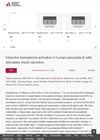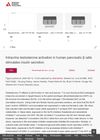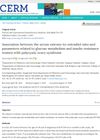36 citations,
March 2005 in “Biotechnology and Bioengineering” A new method speeds up insulin amyloid fibril growth, useful for studying diseases.
 15 citations,
July 2012 in “Biological trace element research”
15 citations,
July 2012 in “Biological trace element research” Higher hair calcium to magnesium ratios and lower chromium levels in hair may indicate insulin resistance in Korean men.
 11 citations,
August 2020 in “Diabetes”
11 citations,
August 2020 in “Diabetes” Testosterone helps human pancreatic cells increase insulin release.

Testosterone in human pancreas cells boosts insulin production.

Testosterone in our bodies helps increase insulin secretion from the pancreas.
November 2001 in “Hair transplant forum international”  4 citations,
December 2021 in “Clinical and Experimental Reproductive Medicine”
4 citations,
December 2021 in “Clinical and Experimental Reproductive Medicine” Higher estrone-to-estradiol ratios are linked to worse glucose metabolism and insulin resistance in women with PCOS.
 February 2022 in “Mediators of Inflammation”
February 2022 in “Mediators of Inflammation” Women with Polycystic Ovary Syndrome (PCOS) have lower levels of a substance called DIAPH1 in their blood, which is linked to changes in sugar metabolism and insulin resistance.
1947 citations,
September 1995 in “New England journal of medicine/The New England journal of medicine” PCOS is a common hormonal disorder causing irregular periods and increased hair growth, linked to insulin resistance and long-term health issues.
 369 citations,
June 2013 in “Biochimie”
369 citations,
June 2013 in “Biochimie” Myo-inositol supplements may improve insulin sensitivity and help with conditions like PCOS and gestational diabetes, but more research is needed.
 343 citations,
December 2008 in “Endocrine Reviews”
343 citations,
December 2008 in “Endocrine Reviews” Metformin helps with menstrual cycles and insulin levels in PCOS but is less effective for hair growth, diabetes prevention, and weight loss, and may improve fertility and reduce diabetes risk.
 258 citations,
July 2016 in “Reproductive Biology and Endocrinology”
258 citations,
July 2016 in “Reproductive Biology and Endocrinology” The document concludes that insulin resistance is key in PCOS development and early treatment is crucial to prevent complications.
 249 citations,
November 2003 in “Clinical endocrinology”
249 citations,
November 2003 in “Clinical endocrinology” Insulin resistance is a key factor in polycystic ovary syndrome, but genetics may also contribute.
 200 citations,
October 2009 in “European journal of endocrinology”
200 citations,
October 2009 in “European journal of endocrinology” Metformin helps manage polycystic ovary syndrome by improving insulin resistance and ovulation, but more research is needed on its full effects.
 198 citations,
July 2011 in “Cochrane library”
198 citations,
July 2011 in “Cochrane library” Lifestyle changes can improve body composition, excess male hormone levels, and insulin resistance in women with PCOS.
 155 citations,
March 2006 in “The American Journal of Medicine”
155 citations,
March 2006 in “The American Journal of Medicine” Women with PCOS have heart-related issues not because of obesity, but due to insulin resistance and low adiponectin levels.
 149 citations,
December 2007 in “The Journal of Clinical Endocrinology and Metabolism”
149 citations,
December 2007 in “The Journal of Clinical Endocrinology and Metabolism” Women with PCOS have overall higher body fat, not abnormal fat placement, and more insulin resistance.
 114 citations,
January 2014 in “World Journal of Gastroenterology”
114 citations,
January 2014 in “World Journal of Gastroenterology” People with PCOS, especially if obese, often have NAFLD, linked to obesity, insulin resistance, and high androgen levels.
 105 citations,
February 2011 in “The Journal of Clinical Endocrinology & Metabolism”
105 citations,
February 2011 in “The Journal of Clinical Endocrinology & Metabolism” Treating sleep apnea in young obese women with PCOS can improve heart health and insulin sensitivity.
 66 citations,
September 2008 in “Dermatologic therapy”
66 citations,
September 2008 in “Dermatologic therapy” The conclusion is that the best initial treatment for hirsutism is usually oral contraceptives, with the addition of antiandrogens or insulin sensitizers if needed, and topical eflornithine or laser treatments as supplementary options.
 61 citations,
January 2015 in “Hormones”
61 citations,
January 2015 in “Hormones” Liraglutide caused significant weight loss in some obese women with PCOS, especially those with severe obesity and insulin resistance.
 60 citations,
February 2010 in “Gynecological Endocrinology”
60 citations,
February 2010 in “Gynecological Endocrinology” Metformin combined with lifestyle changes improves insulin resistance and reduces testosterone levels in women with PCOS more than lifestyle changes alone.
 56 citations,
July 2008 in “European journal of endocrinology”
56 citations,
July 2008 in “European journal of endocrinology” Metformin and rosiglitazone improve blood vessel function in women with PCOS, with metformin also reducing insulin resistance and testosterone levels.
 53 citations,
December 2015 in “JAMA Dermatology”
53 citations,
December 2015 in “JAMA Dermatology” Women with PCOS often have more body hair, acne, and skin darkening, and these signs are linked to metabolic issues like insulin resistance and high cholesterol.
 42 citations,
September 2007 in “The Journal of Clinical Endocrinology and Metabolism”
42 citations,
September 2007 in “The Journal of Clinical Endocrinology and Metabolism” The research found that polycystic ovary syndrome (PCOS) has two distinct types, with one having more severe hormone and insulin issues.
 34 citations,
February 2013 in “The Journal of Clinical Endocrinology and Metabolism”
34 citations,
February 2013 in “The Journal of Clinical Endocrinology and Metabolism” Many young Italian women have hyperandrogenic disorders like PCOS, which are linked to age, body weight, and insulin resistance.
 32 citations,
June 2019 in “Frontiers in Endocrinology”
32 citations,
June 2019 in “Frontiers in Endocrinology” Polycystic Ovary Syndrome (PCOS) is common in women with conditions like anovulation, hirsutism, hair loss, and type 2 diabetes, and it can lead to health risks like heart disease, obesity, insulin resistance, and depression. Non-Classic Congenital Adrenal Hyperplasia (NC-CAH) is also discussed.
 31 citations,
January 2014 in “Clinical Endocrinology”
31 citations,
January 2014 in “Clinical Endocrinology” The study suggests that being overweight or obese, not PCOS itself, is strongly linked to insulin resistance.
 30 citations,
September 2017 in “Clinics in Dermatology”
30 citations,
September 2017 in “Clinics in Dermatology” Acanthosis nigricans is a skin condition that may indicate a higher risk for insulin resistance and type 2 diabetes, and more research is needed to understand and treat it.

























